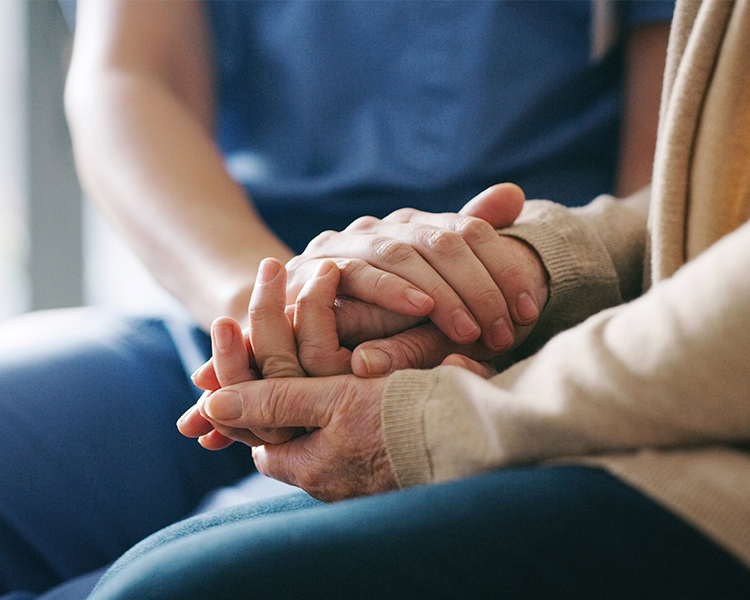Get A Free Legal Consultation
- We fight to maximize your results
- Many clients get results in as few as 90 days
- No out-of-pocket costs for you or your family



Caring for a loved one with mesothelioma can be a complex, overwhelming task. Mesothelioma caregivers often face many challenges, including emotional stress and financial strain.
In addition to managing your own well-being, you may find yourself responsible for tasks like managing medications, organizing appointments, and dealing with medical or legal professionals.
At Simmons Hanly Conroy, we can help mesothelioma caregivers find support and access key resources for both themselves and their loved ones. Call (800) 326-8900 now to talk with our team for free.
As a caregiver for someone with mesothelioma, you may need to take on a number of different roles and responsibilities to support your loved one during this difficult time.
Mesothelioma caregiver tasks can include:
Your responsibilities may also vary depending on your relationship to the patient. Mesothelioma caregivers may be a spouse, child, sibling, or friend.
Regardless, all caregivers play an essential part in helping their loved one feel safe and cared for.


While every caregiving situation is different, the day-to-day tasks can quickly add up, especially if you’re also balancing other responsibilities with work or family.
Daily caregiving duties may include:
These tasks may seem small on their own, but over time, they can become physically and emotionally exhausting — especially as your loved one’s condition progresses. As a result, it’s important for caregivers to care for themselves too.
“My sons and I all became different levels of caregivers. We had to be taught how to clean out a wound on his spine. That’s a lot on anyone, but when you’re looking at the man who has been your rock your entire marriage, and to see him laid open like that, yeah, mesothelioma changed our lives drastically.”
– Connie, Mesothelioma Caregiver & Firm Client
Mesothelioma is a rare and aggressive cancer caused by asbestos exposure. It can form in the lining of the lungs, heart, abdomen, or testes, and symptoms may take decades to appear.
Caring for someone with mesothelioma often requires you to become familiar with the disease, so you can help them make informed decisions about treatment and care.
The following resources can help mesothelioma caregivers learn more about this cancer:
“I’ve got 18 binders full of information. My gift is organization. I worked in logistics. So it’s like, ‘What did that doctor say? Spell that out for me.’”
– Kelley, Mesothelioma Caregiver & Firm Client
Looking for more mesothelioma care information? Call (800) 326-8900. Our team of registered nurses can answer any questions you may have — at no cost to you.

Mesothelioma often presents patients with both a physical and psychological battle. However, studies have shown that emotional challenges also impact mesothelioma caregivers.
Approximately 30% of mesothelioma patients and their caregivers experience depression, 50% struggle with anxiety, and 33% show signs of post-traumatic stress disorder (PTSD). Caregivers report worse mental health outcomes than the patients themselves, according to the European Journal of Oncology Nursing.
Caregivers often must navigate the medical, emotional, and logistical challenges of helping a cancer patient — all while witnessing the suffering of their loved ones or coping with the possibility of their death.
All of this strain can lead to caregiver burnout, which may leave you feeling overwhelmed or unable to continue providing care.
They say you can’t pour from an empty cup — and for mesothelioma caregivers, that couldn’t be more true. Acting as a caregiver can be all-consuming, but it’s important to make time for self-care or reach out for help when you need it.
Caregiver support resources can help you manage stress, take much-needed breaks, and prioritize your own health while caring for someone else.
Find out more about mesothelioma caregiver support resources:
Remember, you are not alone. Whether you need practical tips, emotional support, or just a moment to breathe, there are resources and communities ready to support you.


Home care for mesothelioma allows patients to receive support and assistance in the comfort of their own home. It also offers respite care or temporary relief for mesothelioma caregivers by allowing someone else to take over duties for a period of time.
Home care for mesothelioma patients may be provided by:
Whether you need a few hours to run errands or a few days to rest, respite care ensures your loved one continues to receive quality support while you take time for yourself.
Hiring additional caregivers can be expensive, but compensation may be available to help cover these costs. Contact us now to see if you may be eligible for mesothelioma compensation.
Mesothelioma support groups offer a safe space for patients and caregivers to share their experiences, ask questions, and talk to others fighting this cancer. Joining a support group can help you feel less isolated and provide practical tips to navigate this difficult time.
Some mesothelioma caregivers also find value in joining support groups specifically for caregivers, where they can openly express their own challenges and connect with others in similar roles.
Mesothelioma caregiver support groups and mentors can be found through:
Your health care team or a hospital social worker may also be able to locate a program for you. Both in-person and virtual or online support groups can help reduce stress, improve emotional well-being, and foster a greater sense of community.
“I go to New York with people. I sit with them to have their chemo and go with them to have their surgeries, because I know what that did for me. My mentor is still here today. I want to help people going through this and show them, look, I did this, you can do it too.”
– Mary Jane, Mesothelioma Firm Client


In addition to dealing with burnout, caring for someone with mesothelioma involves taking on different roles that can lead to emotional, physical, and financial strain.
Challenges for mesothelioma caregivers may include:
Acknowledging and addressing these challenges is crucial for caregivers’ well-being. There are strategies and tips available to help you handle these burdens more effectively.
“Being a caregiver to somebody with mesothelioma and a dad at the same time is pretty exhausting, but I’m going to do whatever it takes to get my family across the finish line at the end of the day.”
– Brandon, Mesothelioma Caregiver & Firm Client
It’s easy to put your own needs last when caring for someone with mesothelioma, but prioritizing self-care helps you stay healthy and better support your loved one for the long haul.
Find out more about tips for mesothelioma caregivers:
By developing a team of friends, family, and health care providers, you can give your loved one better care, feel less stressed, and avoid burnout.


Holidays, birthdays, and special occasions are meant to bring joy, but they can also add stress and emotional weight for mesothelioma caregivers and patients.
Routines may be disrupted, emotions can run high, and the desire to make things “normal” might become overwhelming. As a result, it’s important to take a thoughtful, balanced approach to the holidays.
Find out more holiday mesothelioma caregiver tips:
The holidays don’t have to be perfect to be meaningful. With patience, flexibility, and compassion for both your loved one and yourself, you can create joyful moments, even in the midst of uncertainty.
Being a long-distance mesothelioma caregiver can be incredibly difficult. You may feel helpless, guilty, or frustrated that you can’t be there in person every day. However, your support still matters — and there are meaningful ways to stay involved in your family member’s care.
Stay connected with regular phone or video calls, and check in with both your loved one and any local caregivers. Help coordinate medical appointments, manage bills or paperwork online, and research resources or second opinions.
Even small gestures, like sending a care package or handwritten note, can go a long way in reminding your loved one they’re not alone.
Long-distance mesothelioma caregiving isn’t easy, but with communication, organization, and compassion, you can still play a role in supporting your loved one during this difficult time.
Our mesothelioma lawyers regularly work with patients, families, and caregivers across the United States. If your loved one has mesothelioma, our attorneys will travel to you, no matter your location.
Choose your location from the menu or on the map below to learn more about filing a mesothelioma lawsuit in your state.
A mesothelioma caregiver provides physical, emotional, or practical support to a patient with mesothelioma. They often help manage household tasks, administer medications, and attend appointments.
Mesothelioma caregivers can be spouses, adult children, siblings, close friends, or other family members. You don’t need medical training to be a caregiver, just a willingness to support your loved one in any way you can.
Caring for someone with mesothelioma can involve a wide range of responsibilities, including:
Each caregiver’s experience is different, and your role may change as your loved one’s needs evolve.
Being a mesothelioma caregiver often requires you to juggle multiple roles, which can lead to mental health struggles, missed work, and physical exhaustion.
Common challenges faced by mesothelioma caregivers include:
Support is available for mesothelioma caregivers. Contact us now for help pursuing financial compensation, seeking out support groups, and more.
Light exercises like walking, stretching, or gentle yoga can help mesothelioma patients maintain strength, manage fatigue, and improve their mood.
Make sure they avoid any exercises that are too intense or high-impact. The focus should be on comfort and safety, not pushing limits.
End-of-life care for mesothelioma focuses on keeping your loved one comfortable, supported, and at peace in their final days.
This type of care may include:
As a caregiver, your presence, compassion, and willingness to be there in a patient’s final days often mean more than you know.